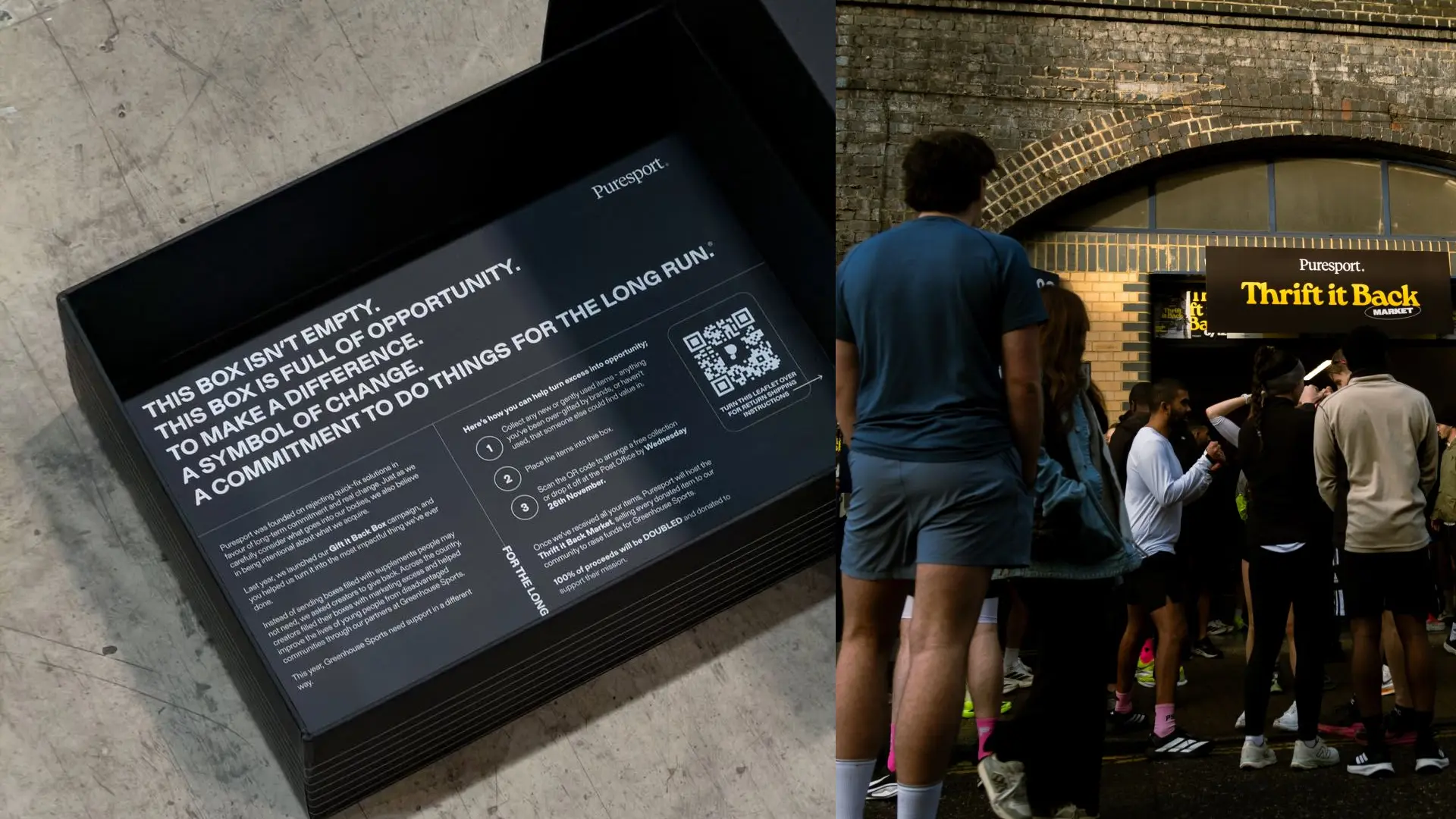It's that time of the year, Black Friday. Once a single holiday of shopping frenzy, now it’s an entire month of 'can't-miss' deals, slashed prices, FOMO, and irresistible brand hype.
One day after Thanksgiving? Try four weeks, and counting.
From the start of November to the annual Single's Day on November 11 to Black Friday to Cyber Monday in the tracks of the peak sales.
Consumers are buying 60% more clothes and wearing them for half as long, according to data cited by the UN Environment Programme.
Yet it's not only the consumers who have a part to play.
Reducing the environmental impact of retail, meeting rising customer expectations while encouraging conscious consumption, balancing profitability with sustainable practices — today’s online retailers have the chance to do it.
Wanting more, better off with less
It's hard to argue against the idea that a cleaner planet benefits everything and everyone, so it's more of a fundamental shift rather than a trend.
Yet it's not only the consumers who have a part to play.
Conventionally, business practices like Black Friday help e-commerce stores improve the company's bottom line before the year's end and boost profit margins as they scale.
There's more.
Every year, the apparel industry needs to go through excess inventory — if it doesn't end up in a landfill — and it's the festive season helps solve the problem, arguably.
The times are changing
Forward-thinking e-commerce businesses fight to make environmental sustainability the industry standard — beyond ethical production, packaging, and transportation emissions.
They seek to rewire the retail ecosystem into a business model that creates sustainable growth, both financially and environmentally, and meaningful shopping experiences.
"I believe that the challenges are mainly threefold. It's complexity, costs, and old ways of thinking," Ben Lundberg, Supply Chain Manager at Nudie Jeans, reflects on the business challenges of sustainable retail.
"I do think that most of the time it comes down to the time aspect — just start by slowing things down."
"Even when we speak to well-intentioned brands they confess they’re stuck in the system that keeps them beholden to fighting for growth and use of retail tricks like discounting," August Bard Bringéus, Co-Founder of ASKET, states.
"Despite the science and a general awakening to the ecological crisis we’re in, businesses and consumers together continue to perpetuate the overproduction and overconsumption society that is the very cause of this crisis."
While most e-commerce companies are beginning their Black Friday campaigns earlier than ever before to ramp up the end-of-the-year demand, others make the headlines by boycotting Black Friday sales and shutting down stores.

Puresport
Lucy Austin, Community Expert at Puresport, UK's performance supplement and hydration brand, writes on her LinkedIn page: "Every year, brands pour millions into Black Friday gifting. And every year, most of it ends up in the same place. 70% of PR gifts never get used. 40% of beauty products end up in landfills, unopened. Last year, we wanted to break that cycle."
They sent creators a box — not to fill their shelves, but to empty them of all the stuff they don't really need. The response was overwhelming. Hundreds of creators got involved, and Puresport collected a huge range of brand-new products that would otherwise sit gathering dust.
In December 2025, Puresport hosted a Thrift It Back Market in London, where every donated item was available for anyone to buy and every penny, matched by Puresport, went into helping create opportunities for young people through sport via Greenhouse Sports, including access to sport, coaching, and mentorship.

ALIGNE
Last year, British luxury womenswear brand ALIGNE took a stand against Black Friday by joining Giving Tuesday, a global initiative encouraging charitable giving over consumer spending.
Rather than running typical Black Friday sales, ALIGNE partnered with Smart Works Charity, a UK-based charity dedicated to supporting unemployed women through clothing and coaching.
Throughout Cyber Week, ALIGNE included pre-paid donation bags with e-commerce orders, covering postage to make donating easy.
On Giving Tuesday, the brand launched its Buy a Dress, Give a Dress campaign, donating a dress to Smart Works Charity for every purchase made.

ME+EM
"This year, as for the last few years, ME+EM won’t be participating in Black Friday," announced the British luxury brand on November 6, 2024.
Known for its commitment to timeless essentials over fast fashion, ME+EM asks — why rush when it comes to crafting quality essentials, and why rush when it comes to choosing them?
Instead of offering discounts for Black Friday 2024, ME+EM will be making a donation to Women for Women International, a charity they've supported throughout 2024.
Women for Women International helps women survivors of war and conflict rebuild their lives, families, and communities by teaching essential skills for doing so.
Founded by Zainab Salbi in 1993 after hearing the stories of women who survived the Bosnian War, the charity has since empowered over half a million marginalized women in 17 conflict-affected countries.

ASKET
When there were all signs we'd forgotten what timeless clothing essentials actually mean, ASKET was born to introduce a permanent, timeless collection of mindfully produced pieces.
In the name of the brand's philosophy — the pursuit of less — ASKET shuts down its online store during Black Friday. In 2021, they went as far as closing the doors to their physical storefront in central Stockholm.
"Businesses and consumers together continue to perpetuate the overproduction-and-overconsumption society," the brand's statement said. "Someone needs to take a stand."
Some of ASKET's dedicated consumer base, overwhelmed by aggressive Black Friday marketing all around, felt a breath of fresh air as they watched the brand press pause amid the craze.
Others seemed frustrated over being unable to take advantage of discounted prices.
The truth is, in order to start shifting heedless business practices and consumption habits, the most powerful thing would be to sell nothing at all.
That's conscious consumption in practice, and Black Friday presents a perfect opportunity to lead by example.

Rituals
The products you know and love, just with less packaging. Home and body cosmetics brand Rituals celebrates Green Friday with discounts on refill products to cut down on excess packaging.
For every refill sold, Rituals pledges to "plant, protect, or restore a tree."
Launched in 2015, Green Friday offers an alternative to Black Friday’s overconsumption, inviting people to pause, reflect on their buying habits, and make mindful choices.
Instead of splurging, Green Friday encourages consumers to support small businesses, shop local, focus on sustainability, and choose brands that are donating profits to give back to our planet and those in need.

Lucy & Yak
Since 2018, Lucy & Yak has taken a different approach to Black Friday. Known for their signature dungarees, the British clothing brand, founded in 2017, will be donating half of their profits from their entire catalog between November 21-27, 2024, to the Fior Di Loto India Foundation.
Not only does the foundation provide life-changing education for girls living in the villages surrounding Pushkar in Northwest India, but it continues to support them throughout university and beyond.
To mark the charity campaign's sixth anniversary, supporting Fior Di Loto, Lucy & Yak asked the girls to share some drawings of things that make them happy.
The brand's design team then transformed these sketches into the Fior Di Loto Original Dungaree, symbolizing the transformative power of education and the importance of making it accessible to people everywhere.
100% of the profits from the dungaree goes to the Foundation.

Adanola
On 14 November, 2023, British activewear brand Adanola announced on Instagram that it "won't be taking part in Black Friday sales."
“We no longer feel that taking part in Black Friday sales aligns with our efforts to deliver quality products at an accessible price and supply products to genuine demand,” the statement read.
Within hours, Adanola’s Instagram post gathered hundreds of comments, many criticizing the decision.
Despite not anticipating such a strong reaction, the brand’s owner and CEO, Hyrum Cook, told Drapers the team's committed to their choice to boycott excessive holiday shopping and discounts.

Patagonia
Built for years, not for seasons. Patagonia, who has made Earth its sole shareholder, has been leading anti-Black Friday campaigns since way back in 2011, long before it was cool.
It all began with a bold ad in The New York Times, featuring one of their jackets alongside a simple message — don't buy this jacket.
"The impact that the fast fashion industry is having on designing for obsolescence at the onset, to chase a trend, is destroying the planet," Tyler LaMotte, Product and Marketing Director (EMEA) at Patagonia, told Euronews at the Cannes Lions International Festival of Creativity.
The Black Friday message, used as an opportunity to draw attention to the environmental impact of the fashion industry and encourage conscious consumption, was the first but not the last to go viral.
Like it or not, you can't deny that Patagonia jackets last as long as three average fashion products, which gives their campaign real credibility.
What to know how your brand stacks up against the industry during peak season?
Go to Black Friday 2025 Recap for online sales volume and delivery performance benchmarks across 250+ retailers.







